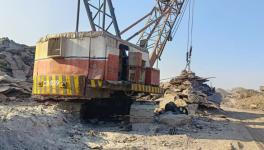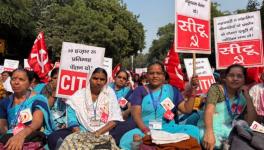Not All Shiny at India’s Largest Pig Iron Producer
Representational use only.
New Delhi: The largest pig iron producer in India, Neelachal Ispat Nigam Limited, (NINL) was put up for disinvestment in January 2019. Almost three years later the process is far from complete. NINL is jointly owned by other national and state public sector units, and the Department of Investment and Public Asset Management (DIPAM) has listed 93.71% of it for sale to a private bidder.
NINL’s iron and steel plant spread over 2,500 acres in Kalinganagar, rural Odisha has a capacity to produce 1.1 million tons of iron and 0.92 million tons of steel a year using its 1,500 full-time (and 3,500 contractual) employees. NINL started production of pig iron in 2002 and added a steel melting shop in 2014 to add value to the pig iron they produce.
The Metals and Minerals Trading Corporation of India (MMTC) holds a majority stake at 49.78%, which it bought in 2016, while the Odisha Mining Corporation (OMC) holds 20.47% and the Industrial Promotion and Investment Corporation of Odisha Ltd (IPICOL), a 12% stake.
This sale of the public’s stake has missed two deadlines and is listed to be complete by March 2022 now, a deadline that is certain to be missed. A few private firms including Tata Steel, Arcelor Mittal/Nippon Steel, Jindal Steel Works, Vedanta and Megha Engineering Infrastructure Limited (MEIL) did their due diligence and gave the government their expressions of interest by 31 March 2021.
More than 7 months later, DIPAM has not invited financial bids from the interested parties, as a request for proposals. Ritu Sharma, undersecretary in DIPAM, refused to share details of what stage the process is in and asked NewsClick to contact officials in SBI Capital, the banker for the process. It looks likely now that financial proposals will only be made in 2022, as the process will take at least 30 days from announcement to proposals being received and evaluated.
PRECARIOUS FINANCES
“Interest to be paid just on loans to banks is about Rs 400 crore annually, while the salaries are Rs 120 crore annually,” said Ajit Kumar Pradhan, general secretary of the Neelachal Executive Association. This means that if disinvestment is pushed forward by another year, interest on the loans and salaries will add at least Rs 520 crore each for 2021 and 2022, and push up the liabilities (debts) of NINL to higher than it has been valued. In February 2019, NINL was valued at Rs 8,271 crore, by MECON, (that includes Rs 2500 crores of land and Rs 2487 crore of the captive mines).
In 2020 NINL owed Rs 6159 crore to banks while the equity invested by promoters is Rs 741 crore, (a total of 7200 crore). The difference between the debts of NINL and the value of to its assets was about Rs 1071 crore until last year, (8271-7200 crores) two more years will add Rs 1040 crore to debts and NINL’s debts will come close to the value assigned to it.
RUNNING IN THE RED
For 11 years, from 2008- 2018 the blast furnace at Neelachal Ispat Nigam Limited ran at an average capacity of 50-60%. The reason for this was that capital repairs were not made since starting operations in 2002. A blast furnace has a steel shell, fireproof brick lining inside which needs repair and change every few years and a second refractory lining inside that needs replacement every few months, depending on use.
The Tata Steel blast furnace at Jamshedpur, just a few hundred kilometres away from the NINL plant has been running for over 104 years now and produces 6.8 million tonnes of steel a year. With proper capital repairs, the life and utilisation of the plant increases, as does the profitability of the operation.
“If you operate the plant at 100% utilisation you might earn 10 Rupees, but if you operate at 50% you might not even earn a rupee because the cost dynamics will change drastically,” explained Ajay Dhaka, Analyst with CARE Ratings.
This low utilisation was one reason for the NINL plant running losses and they have added up over the years. Capital repairs of the NINL blast furnace were started in November 2017 and completed in April 2018. After this repair, in 2019 utilisation of the blast furnace increased to 76%, but this success was short-lived as in July 2019 lead promoter MMTC stopped supplying iron ore and NINL shut down the blast furnace.
“The country was facing an iron ore shortage, of late, commercial mines had to be re-auctioned and the mines took some time to start operations, this created some shortage of iron ore in the country,” said Ajay Dhaka.
Public sector units have increased their mining and the Union government has allowed them to sell 50% of iron ore in the open market to overcome this shortage.
Once a company has gone into financial stress, it may not have the funds to procure raw materials (iron ore). NINL was allotted captive iron ore mines in 1999, in the Koira block of Sundergarh and Keonjhar districts of Orissa. The mines are estimated to hold about 110 million metric tonnes, enough ore to keep the plant running for more than 50 years. For 20 years NINL did not develop these mines and bought iron ore through MMTC, paying a 3% premium on all purchases of ore. It was only in August 2021, when the plant has been shut for two years and had no money to even pay employee salaries, that permission was obtained to mine 1 million metric tonnes a year for two years to meet expenses. Ore mined until now has still not been sold, and E-auction on November 12, 2021, was supposed to sell the first 4000 metric tons of ore.
Meanwhile, due to the non-availability of coal, the coke oven shut down on March 27, 2020, and, Tata Power cut power supply to the plant for non-payment of dues in 2021.
EMPLOYEES AND PROMOTERS LOSE OUT
Throughout this process, employees of NINL have been the losers, they have not been paid for a year, on November 4, 2021, they were paid 70% of their salaries till November 2020 (just basic and dearness allowance). During the COVID-19 pandemic in 2020, salaries were not paid for 10 months. Through the Neelachal Executive Association, employees tried all they could, going on strike, petitioning Members of Parliament and Members of Legislative Assembly and also filed a case in the courts to get their dues. In 2021, the Orissa High Court ordered to NINL pay salaries by selling the iron ore it had started mining in the open market.
Even NINL’s promoter, MMTC, one of the oldest public sector units, incorporated in 1963 is in the red. “MMTC has gone into some sort of financial stress, they are rated D or default. For this financial distress, NINL is one of the reasons. MMTC had given bank guarantees for NINL’s loans, which they have to service,” said Ajay Dhaka, an analyst with CARE Ratings.
Initially, when the Government had announced the sale of NINL, in January 2019 Union minister Prakash Javedkar had said that it would be through an auction. The current process is very different, a two-stage process where first bidders are selected and vetted by the government and then invited to give their financial bids.
At one stage, in July 2021, the Ministry of Commerce had objected to the valuation of NINL, this has also delayed the process. It is unclear whether this has been resolved (DIPAM has overruled objections of the Ministry of Commerce, a source told NewsClick).
Steel, an essential raw material is heavily used in infrastructure, roads, tunnels and bridges that the Public Works Department and National Highways Authority of India are making in an infrastructure push. In 2019, India imported 8.9 million tons of steel, paying foreign exchange to buy it. Specialty steel is so important that the Government of India has announced ₹6,322 crore as incentives over five years to firms that manufacture specialty steel. It belies logic why a plant with a working steel melting shop with a capacity to make 0.92 million metric tons of steel (and 1 million tons of pig iron a year which can be used to make steel) has been shut since May 2019.
Whatever happens next, the public as owners of NINL and employees will be the losers. It can still be a win for all if the Steel Authority of India takes over NINL and re-starts the plant. The employees of NINL are still pleading to anyone who cares to listen.
Saurabh Yadav is an independent journalist. He tweets at @therealsaurabh
Get the latest reports & analysis with people's perspective on Protests, movements & deep analytical videos, discussions of the current affairs in your Telegram app. Subscribe to NewsClick's Telegram channel & get Real-Time updates on stories, as they get published on our website.
























